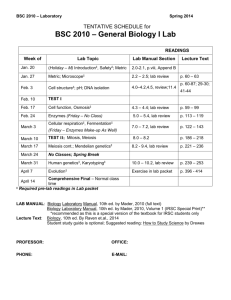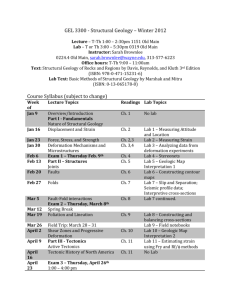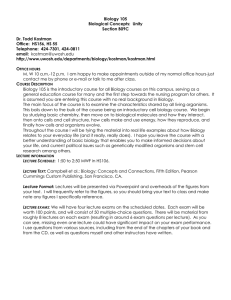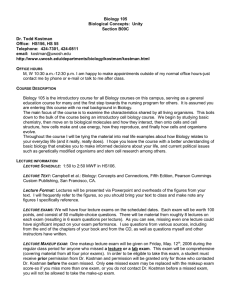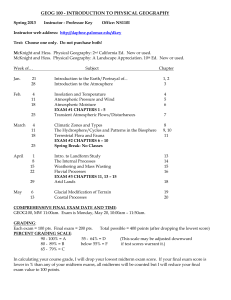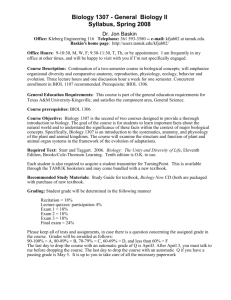View Syllabus
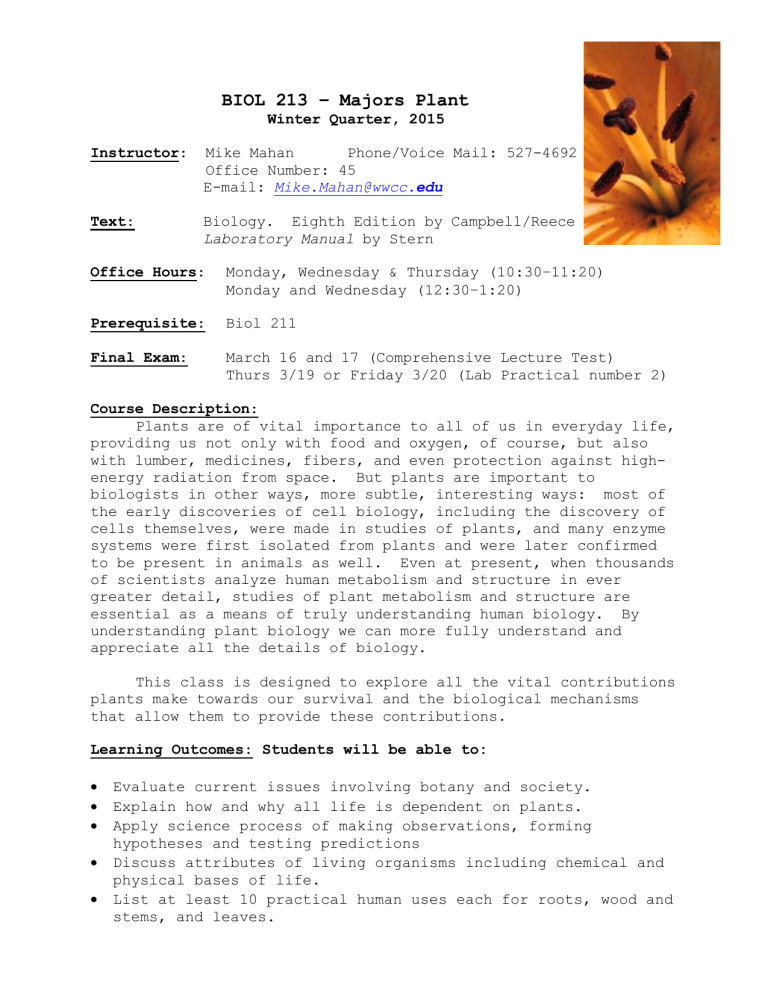
BIOL 213 – Majors Plant
Winter Quarter, 2015
Instructor : Mike Mahan Phone/Voice Mail: 527-4692
Office Number: 45
E-mail: Mike.Mahan@wwcc.edu
Text : Biology. Eighth Edition by Campbell/Reece
Laboratory Manual by Stern
Office Hours : Monday, Wednesday & Thursday (10:30–11:20)
Monday and Wednesday (12:30–1:20)
Prerequisite : Biol 211
Final Exam : March 16 and 17 (Comprehensive Lecture Test)
Thurs 3/19 or Friday 3/20 (Lab Practical number 2)
Course Description :
Plants are of vital importance to all of us in everyday life, providing us not only with food and oxygen, of course, but also with lumber, medicines, fibers, and even protection against highenergy radiation from space. But plants are important to biologists in other ways, more subtle, interesting ways: most of the early discoveries of cell biology, including the discovery of cells themselves, were made in studies of plants, and many enzyme systems were first isolated from plants and were later confirmed to be present in animals as well. Even at present, when thousands of scientists analyze human metabolism and structure in ever greater detail, studies of plant metabolism and structure are essential as a means of truly understanding human biology. By understanding plant biology we can more fully understand and appreciate all the details of biology.
This class is designed to explore all the vital contributions plants make towards our survival and the biological mechanisms that allow them to provide these contributions.
Learning Outcomes : Students will be able to:
Evaluate current issues involving botany and society.
Explain how and why all life is dependent on plants.
Apply science process of making observations, forming hypotheses and testing predictions
Discuss attributes of living organisms including chemical and physical bases of life.
List at least 10 practical human uses each for roots, wood and stems, and leaves.
Learning Outcomes Continued . . .
Utilize knowledge of the origin, development, form, function, strategies, and adaptations of: plant tissues, roots
(specialized), stems, leaves, flowers, fruits, and seeds in labs and projects and be able to distinguish, draw, compare and contrast different types
Explain botanical principals using botanical terms.
Identify factors that control dormancy and how dormancy may be broken both naturally and artificially.
Demonstrate knowledge of the pathway, movement, and utilization of water in plants.
Demonstrate understanding of metabolic concepts
(photosynthesis, respiration, and additional pathways.
Contrast growth, differentiation, and development and distinguish among nutrients, vitamins, and plant hormones.
Solve genetic problems.
Apply propagation techniques.
Use a dichotomous key to identify plants.
Recognize the features that members of Kingdoms share with each other and what distinguishes them from other Kingdoms.
Exams
There will be two unit exams, two lab practicals, and a comprehensive final exam. The exams will consist of definitions, multiple choice, true and false, short answer, matching and essaytype questions.
Grading : Your grade will be based on the following:
Quizzes: Questions based on lecture and reading assignments
Hour Exams: 2 exams
Final Exam: Comprehensive
Lab Reports: Each completed lab in lab manual
Lab Practicals: Midterm and Final
Miscellaneous: As assigned with varying point values
Grade : Follows normal grading scale: 92.5-100% = A
90-92.5% = A-; 87.5-90% = B+; 82.5-87.5% = B;
80-82.5% = B-; 77.5-80% = C+; 72.5-77.5% = C;
70-72.5% = C-; 67.5-70% = D+; 60-67.5%=D;
Absence from Exams
Absence from an exam is excusable only when it results from a conflict with an official college function or illness. In either case, it is your responsibility to notify me of your impending
absence prior to the test taking place or no make-up will be allowed. If you are ill the day of a test you must call or e-mail me before the scheduled exam time.
Labs : Lab exercises cannot be made up, so check with me if you are anticipating an absence.
Majors Plant Labs
Week 1
January 8
Photosynthesis
Week 2
January 15
Lab 2: The Plant Cell
Lab 3: Plant Mitosis (Review)
Lab 12: Meiosis & Alternation of Generations (Review)
Week 3
January 22
Week 4
Jan. 29
Lab 7: Plant Propagation
Lab 4: Roots
Lab 6: Leaves
Week 5
Feb 2 Graft
Feb 5 Lab
Monday: Grafting Propagation (Trees)
Lab 9: Diffusion, Growth, and Hormones
Week 6
February 12
Lab 5: Stems
Week 7
Feb. 16 Exam
Feb. 19 Lab
Monday: Midterm Lab Practical Exam
Lab 14: Kingdoms Archaea, Eubacteria, and Protista
Week 8
Feb. 26
Week 9
March 5
Lab 15: Mycology
Lab 16: Bryophytes through True Ferns
Lab 17: Gymnosperms
Week 10
March 12
Lab 18: Angiosperms
Lab 19: Fruits, Spices, Survival Plants, and
Poisonous Plants
Week 11
March 19/20
Thursday/Friday: Lab Final
Study Skills
1. Study on a regular basis using blocks of 1-3 hours. Make your study time count, don't get distracted and don't spend too much time on something you find troublesome. Use my office hours to address such problem areas.
2. Skim the text assignment before lecture. Read at least the first and last sentence of each paragraph to get the major points. Listen carefully in lecture and record succinctly the main lecture points in your notes. Do not take notes to the point where you do not try to understand the lecture.
3. After each class review your notes, read the text carefully and record any areas of confusion so you may ask questions.
4. Use your time wisely - do not wait until just before test.
Course Topics:
The Development of the Field of Botany
Plant Cells
Plant Tissues
Roots and Soils
Stems
Leaves
Flowers, Fruits and Seeds
Water in Plants
Plant Metabolism
Growth
Meiosis and Alternation of Generations
Genetics
Plant Biotechnology and Propagation
Evolution
Plant Names and Classification
Kingdom Eubacteria and Viruses
Kingdom Protista
Kingdom Fungi and Lichens
Bryophytes
Vascular Plants: Ferns and their Relatives
Gymnosperms and Angiosperms
Flowering Plants and Civilization
Ecology

